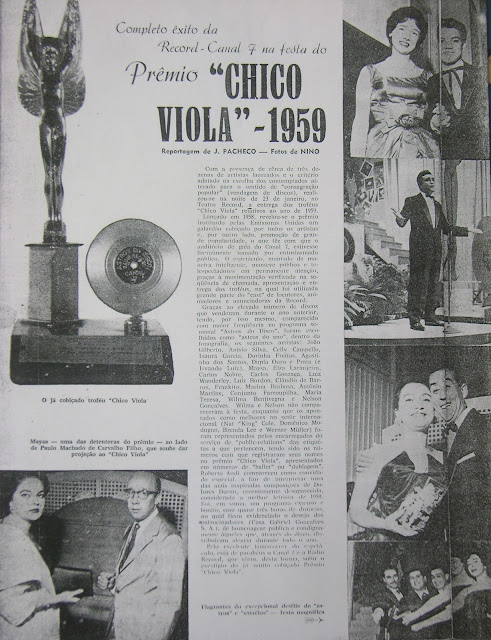1. País tropical Wilson Simonal Odeon
2. Aquele abraço Gilberto Gil Philips
3. Sentado à beira do caminho Erasmo Carlos RGE
4. A namorada que sonhei Nilton Cesar RCA
3. Sentado à beira do caminho Erasmo Carlos RGE
4. A namorada que sonhei Nilton Cesar RCA
5. F... comme femme Adamo Odeon
6. Sou louca por você Elizabeth Caravelle
7. Tudo passará Nelson Ned Copacabana
8. O pequeno burguês Martinho da Vila RCA
9. Adeus, ingrata Claudio Fontana Copacabana
6. Sou louca por você Elizabeth Caravelle
7. Tudo passará Nelson Ned Copacabana
8. O pequeno burguês Martinho da Vila RCA
9. Adeus, ingrata Claudio Fontana Copacabana
10. Eu disse adeus Roberto Carlos CBS
11. Férias na India Nilton Cesar RCA
11. Férias na India Nilton Cesar RCA
12. Uma lagrima (Una lacrima) Paulo Henrique RCA
13. Deixa-me outro dia, menos hoje Agnaldo Timoteo Odeon
14. O vagabundo (Il giramondo) Os Incriveis RCA
15. Será? Marcos Roberto Continental
16. Se eu pudesse conversar com Deus Antonio Marcos RCA
17. Aqueles tempos (Those were the days) Joelma Chantecler
16. Se eu pudesse conversar com Deus Antonio Marcos RCA
17. Aqueles tempos (Those were the days) Joelma Chantecler
18. Aqui Martinha Copacabana
19. Casa de bamba Jair Rodrigues Philips
20. Murmura o mar (Bruit des vagues) Altemar Dutra Odeon
21. Não fico mais sem teu carinho Antonio Marcos RCA
22. Distante dos olhos (Lontano dagli occhi) Moacyr Franco Copacabana
23. Vou pedir outra vez Paulo Sergio Caravelle
24. O amor é tudo (Love is all) Agnaldo Rayol Copacabana
25. Se ela voltar Wanderley Cardoso Copacabana
19. Casa de bamba Jair Rodrigues Philips
20. Murmura o mar (Bruit des vagues) Altemar Dutra Odeon
21. Não fico mais sem teu carinho Antonio Marcos RCA
22. Distante dos olhos (Lontano dagli occhi) Moacyr Franco Copacabana
23. Vou pedir outra vez Paulo Sergio Caravelle
24. O amor é tudo (Love is all) Agnaldo Rayol Copacabana
25. Se ela voltar Wanderley Cardoso Copacabana
26. Tão belo era outrora (Memories are made of this) Roberto Barreiros Chantecler
14 March 1970 - Things had been changing (for the worse) steadily but surely since 13 December 1968, when there was a 'coup within the 1964 coup'. The military junta turned the screws even tighter. Most of the Brazilian press that wholeheartedly embraced the coup d'etait 6 years earlier were now having 2nd thoughts about their folly in helping to oust a representative democracy and take a jump into the darkness of totalitarianism that no one knew where it would stop if stop it woud at all.
TV Record knew it was losing ground rapidly to Rio de Janeiro's TV Globo, the darling of the regime. TV Excelsior which had been the #1 TV station prior to the coup was about to die, TV Tupi was just 'hanging there'. Brazil was fast going from a democracy (since 1946) into a one-party-state and now a one-TV-network-country.
Just before Christmas 1968 the military had turned even more sanguinary and introduced total censorship of the press through infamous AI-5 (Institutional Act #5). Many people saw no other way out and left the country altogether. Singer-song-writers Gilberto Gil & Caetano Veloso were kidnapped by a para-military group, encarcerated and forced to leave the country seeking asylum in London, England. Ironically, Gilberto Gil recorded 'Aquele abraço', his last song before leaving for the UK went straight to Number One, ending up as the 2nd best selling single in 1969.
Geraldo Vandré's 'Caminhando' was banned by the Junta and TV Record was afraid to include it in Chico Viola's list of best selling records of 1969, which it was.
1970 would be the year the Dictatorship would 'consolidate' its power due to the popularity of the Brazilian football team at the World Cup in Mexico.
1970 would be the year the Dictatorship would 'consolidate' its power due to the popularity of the Brazilian football team at the World Cup in Mexico.

.jpg)





























































